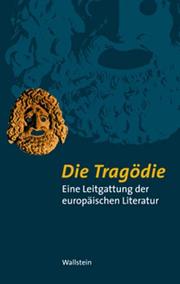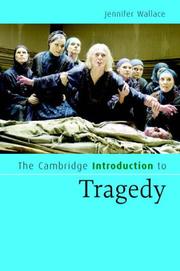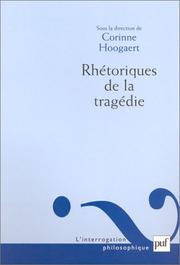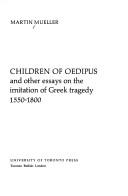| Listing 1 - 10 of 23 | << page >> |
Sort by
|

ISBN: 3892446806 Year: 2003 Publisher: Göttingen : Wallstein,
Abstract | Keywords | Export | Availability | Bookmark
 Loading...
Loading...Choose an application
- Reference Manager
- EndNote
- RefWorks (Direct export to RefWorks)
Book
ISBN: 1783081619 1783081538 Year: 2014 Publisher: London : Anthem Press,
Abstract | Keywords | Export | Availability | Bookmark
 Loading...
Loading...Choose an application
- Reference Manager
- EndNote
- RefWorks (Direct export to RefWorks)
The idea of the tragic has permeated Western culture for millennia, being closely bound with the concept of the limit of inescapable necessity that has been embodied in and expressed through theatre since the time of the ancient Greeks. This book addresses the question of how the twentieth century - one of the most violent periods of human history - dealt with the fundamental structure that is the tragic. Examining the consciousness of the era through an in-depth analysis of some of the twentieth century's most outstanding texts - including works by Ibsen, Claudel, O'Neill, Brecht, Camus, Beckett, Pasolini, Grotowski, Delcuvellerie and Josse De Pauw - 'Modern European Tragedy' draws a vivid picture of the development that tragedy experienced during this time.
European drama (Tragedy) --- European drama --- Tragedy --- History and criticism.

ISBN: 9780521855396 052185539X 9780521671491 0521671493 Year: 2007 Publisher: Cambridge: Cambridge university press,
Abstract | Keywords | Export | Availability | Bookmark
 Loading...
Loading...Choose an application
- Reference Manager
- EndNote
- RefWorks (Direct export to RefWorks)
Tragedy is the art-form created to confront the most difficult experiences we face: death, loss, injustice, thwarted passion, despair. From ancient Greek theatre up to the most recent plays, playwrights have found, in tragic drama, a means to seek explanation for disaster. But tragedy is also a word we continually encounter in the media, to denote an event which is simply devastating in its emotional power. This introduction explores the relationship between tragic experience and tragic representation. After giving an overview of the tragic theatre canon - including chapters on the Greeks, Shakespeare, Ibsen, Chekhov, post-colonial drama, and Beckett - it also looks at the contribution which philosophers have brought to this subject, before ranging across other art-forms and areas of debate. The book is unique in its chronological range, and brings a wide spectrum of examples, from both literature and life, into the discussion of this emotional and frequently controversial subject.
Drama --- Tragedy --- European drama (Tragedy) --- History and criticism --- Tragedy. --- History and criticism. --- European drama (Tragedy) - History and criticism
Book
ISBN: 317010988X 9783170109889 Year: 1990 Volume: 128 Publisher: Stuttgart: Kohlhammer,
Abstract | Keywords | Export | Availability | Bookmark
 Loading...
Loading...Choose an application
- Reference Manager
- EndNote
- RefWorks (Direct export to RefWorks)
Book
ISBN: 9782600058056 9782600158053 2600058052 Year: 2017 Volume: 44 Publisher: Genève: Droz,
Abstract | Keywords | Export | Availability | Bookmark
 Loading...
Loading...Choose an application
- Reference Manager
- EndNote
- RefWorks (Direct export to RefWorks)
La renaissance de la tragédie s’accompagne, aux XVIe et XVIIe siècles en Europe, de l’éclosion de formes dramatiques qui se situent à ses marges, sans pour autant être marginales. La tragédie occupe alors une position à la fois centrale et décentrée au sein d’un ensemble mobile et plus vaste, que l’on peut qualifier de théâtre sérieux. Il fallait penser cette place et modéliser les relations dynamiques et complexes entre la tragédie et ces autres formes. Cet ouvrage revisite également les usages de ce théâtre, interrogeant par exemple la place dévolue au théâtre didactique, les types d’émotions engagés par les fictions à sujet grave, la mobilisation éventuelle d’un décryptage allégorique et la possibilité de parler de « drame » épique. Enfin, il s’intéresse à la manière dont les poètes accommodent les différentes formes de théâtre sérieux aux enjeux d’un monde nouveau, prenant acte d’un changement de paradigme culturel : comment un théâtre érudit ou commercial, dans tous les cas non liturgique, peut-il prendre en charge les récits religieux, biblique ou hagiographique ? Qu’en est-il de la représentation de l’histoire nationale, notamment dans les puissantes monarchies qui sont en train de se constituer, en Espagne, en France et en Angleterre ? Dans quelle mesure le retour au premier plan de formes héritées de l’Antiquité s’accompagne-t-il de ces préoccupations idéologiques nouvelles ?
European drama (Tragedy) --- History and criticism. --- Drama --- Literature --- anno 1500-1599 --- anno 1600-1699 --- Europe --- European drama (Tragedy) - History and criticism.
Book
ISBN: 9789004460126 9789004460058 Year: 2021 Publisher: Leiden;Boston BRILL
Abstract | Keywords | Export | Availability | Bookmark
 Loading...
Loading...Choose an application
- Reference Manager
- EndNote
- RefWorks (Direct export to RefWorks)
"This book is the sum of Agnes Heller's reflections on European history and culture, seen through the prism of Europe's two unique literary creations: tragedy and philosophy"--
E-books --- Tragedy. --- European drama (Tragedy) --- Philosophy, European --- History and criticism. --- History.
Book
ISBN: 9791094512166 Year: 2020 Publisher: Bordeaux : Editions la tempête,
Abstract | Keywords | Export | Availability | Bookmark
 Loading...
Loading...Choose an application
- Reference Manager
- EndNote
- RefWorks (Direct export to RefWorks)
Orphisme --- Tragique (littérature) --- Tragedy --- European drama (Tragedy) --- Orpheus - (Greek mythological character)
Book
ISBN: 9789004713215 9004713212 9789004713208 Year: 2025 Publisher: Leiden, The Netherlands : Brill,
Abstract | Keywords | Export | Availability | Bookmark
 Loading...
Loading...Choose an application
- Reference Manager
- EndNote
- RefWorks (Direct export to RefWorks)
An exploration of one of the most popular and influential genres of early modern theatre: revenge tragedies.
European drama (Tragedy) --- Revenge --- Theater and society --- Theater --- Tragedy --- History and criticism. --- History --- History and criticism

ISBN: 2130536212 Year: 2003 Volume: *21 Publisher: Paris : PUF,
Abstract | Keywords | Export | Availability | Bookmark
 Loading...
Loading...Choose an application
- Reference Manager
- EndNote
- RefWorks (Direct export to RefWorks)
Tragedy --- Tragédie --- Philosophy --- History and criticism --- Philosophie --- Histoire et critique --- European drama (Tragedy) --- Tragédie --- Tragic [The ] --- History

ISBN: 1487576722 9780802063816 0802063810 9781487576721 Year: 2018 Publisher: Toronto
Abstract | Keywords | Export | Availability | Bookmark
 Loading...
Loading...Choose an application
- Reference Manager
- EndNote
- RefWorks (Direct export to RefWorks)
The essays in this volume deal with the uses of Greek tragedy by European playwrights between the Renaissance and the Romantic period. While the individual essays include discussions of plays by Neo-Latin, Italian, French, and German playwrights, they aim at isolating the strategies of adaptation and patterns of transformation shared by the different writers as heirs to a common dramatic tradition. The first essay traces the crucial impulses that European tragedy received from the humanist imitation of ancient drama and concludes with a detailed analysis of Garnier's Antigone. This is followed by a study of Racine's Phedre as both an embodiment of and an exception to the characteristic strategies of adaptation used by seventeenth-century playwrights. A turning point in the understanding of Greek tragedy is illustrated by a comparison of Goethe's Iphigenia auf Tauris and Kleist's Penthesilea. A fourth essay, analysing two characteristic strategies in coping with the problem of knowledge in Oedipus Rex, examines that approaches taken by Voltaire, Kleist, Corneille, and Schifler and discusses Ibsen's Ghosts as the prototype of modern analytical tragedy. The next essay turns to scriptural tragedy, discussing Buchanan's Jephtha as the prototype of a genre of Christian tragedy, which applied strict imitation of Greek tragic form to theologically intractable subjects from the Old Testament. The essay concludes with a study of Athalie and Samson Agonistes as the two belated masterpieces of this sub-genre of humanist drama. Finally, the volume addresses the interaction of epic and dramatic traditions in two essays showing Milton's use of the conventions of the tragedy of knowledge in Paradise Lost and Racine's use of the Dido tragedy as the model for Berenice. This encompassing survey of an enduring dramatic tradition offers useful background for the study of drama and all those interested in the continuing life of the classical tradition
European drama (Tragedy) --- Greek drama (Tragedy) --- Greek drama --- European drama --- Greek influences. --- History and criticism. --- Adaptations --- Appreciation --- Europe. --- Council of Europe countries --- Eastern Hemisphere --- Eurasia
| Listing 1 - 10 of 23 | << page >> |
Sort by
|

 Search
Search Feedback
Feedback About UniCat
About UniCat  Help
Help News
News